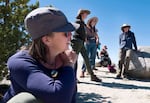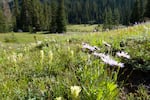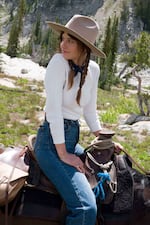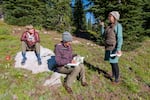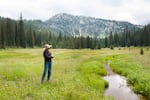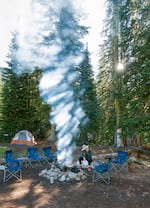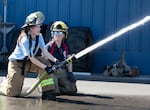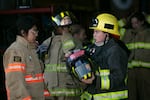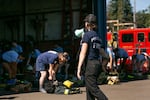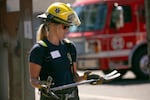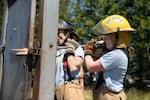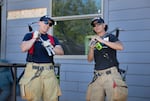By all accounts, Jean MacDonald Birnie and Grace Carter McKennon were unusual women for their time. Born in 1885 in Island City, outside of La Grande in Eastern Oregon, they were lifelong friends. As girls, they’d ride their horses in the hills above the Grande Ronde Valley in search of wildflowers and dine on berries they foraged along the way.

In this composite photo, lifelong friends Jean MacDonald (left) and Grace Carter (right) pose for studio portraits in the Victorian manner of their childhood. The girls would style themselves very differently as adults. Circa 1900
Courtesy of the Reece Family Archive
“Early on, Jean and Grace would take off on their own and kind of discover who they were as individuals and their relationship with nature and horses,” said Grace’s granddaughter Melissa Reece Over. “It just was so much a part of who they were.”
Melissa said the time spent in the outdoors helped the friends develop resilience.
“They found their peace and their contentment in nature and among friends and among horses and their dogs,” she said.
But peace was not the only thing the two friends were after.
“They were always kind of conniving to do stuff that wasn’t real respectable,” said Jessica Lackaff, Grace’s great-grandniece and unofficial family historian. “They tended to push the boundaries. They were very independent.”
Grace was rumored to have ridden horseback by herself all the way from La Grande to John Day, a distance of some 130 miles through the Blue Mountains.
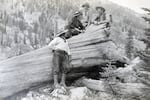
This photo provided by the Reece Family Archive shows George Birnie, left, Jean MacDonald Birnie, Grace Carter and Raymond McKennon, right, in the Wallowa Mountains in 1913.
Courtesy of the Reece Family Archive
One well-documented horseback trip to the nearby Wallowa Mountains in 1913 shows Jean, her husband George Birnie, her friend Grace and a young man named Raymond McKennon. Photos show the foursome traversing steep mountainsides on horseback, crossing streams on downed timber and cooking their meals over an open fire, and apparently enjoying every minute of it. At the time, Grace and Raymond were not married, which may have raised eyebrows in an era when single people rarely met unchaperoned.
“I think that they were a little bit ahead of their time as young women,” Jessica said. “Always kind of pushing past what their parents thought was acceptable.”
Melissa and Jessica have long been inspired by the story of Jean and Grace, who would go on to spark the formation of a group known as the “Hen Party.” For some 30 years, this all-female coalition broke away from traditional gender roles to venture into the Wallowas on annual horse packing trips. In the summer of 2023, descendants of the original Hen Party, including Melissa and her two daughters, headed back into the Eagle Cap Wilderness to commemorate their ancestors’ independent spirit and love of nature.
“The Hen Party has always been a part of our family story and I think I have a longing for that experience, I can imagine it,” Melissa said. “And the Hen Party I don’t think, would be what it is without Grace.”
Hatching plans
In the summer of 1914, just a year after their memorable, if somewhat scandalous adventure in the mountains, Jean sent a fine new pair of riding boots to Grace, who was teaching school in Hood River. The package also contained a mysterious message.
“A plot is brewing,” Jean wrote to her friend. “If only you knew the mental effort that has gone into the formation of this scheme, in its every detail, you would be quite sure that somebody has your happiness at heart.”
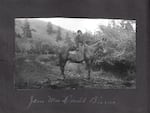
Hen Party founder Jean MacDonald Birnie is pictured on horseback prior to a pack trip into the Wallowa Mountains in 1913.
Courtesy of the Reece Family Archive
The new boots were part of a plan to enlist Grace on a cattle drive that would put her in the company of Raymond to Fairbanks, Alaska.
All signs indicate that Grace signed onto the adventure with relish. She kept a daily journal as she made her way from Hood River to Seattle by train, up the inside passage to Cordova, Alaska by ship, and then by wagon and horseback to Fairbanks. Following a dangerous river crossing in which Raymond nearly drowned, Grace realized how important he’d become to her. The couple married the following January, in 1915.
As married women, Jean and Grace ran households and raised children. Jean had a son, and Grace had three children. Despite these responsibilities, or maybe because of them, the friends never stopped longing for the mountains.
“They basically told their husbands they were gonna go horse packing in the mountains, and they didn’t need the men,” Jessica recounted.
It was a daring proposition for the 1920s, but women all around them were shedding the Victorian strictures they’d been raised with and widening their horizons.
In 1912, Oregon women won the right to vote. A few years later, the 19th Amendment enfranchised most American women, giving them a new sense of agency. Jessica said it might have affected the way Jean and Grace thought of their own capabilities.
“This is sort of a big step forward in the thinking of women,” she said. “You know, ‘Maybe we can vote in an election and just have our own opinion. Maybe we can go to the mountains and just to do it ourselves.’”
In reading Grace and Jean’s lifetime of correspondence, Jessica found no record of a first Hen Party but did see references to the idea of an all-female horse-packing trip.
But their ambitious scheme did not go as planned.
The Hen Party is born
In 1926, Grace contracted scarlet fever and died at home, leaving three young children — including Melissa’s mother. Devastated by the loss of his wife, Raymond was unable to look after his children. Melissa said Jean and Grace had agreed to care for one another’s children in the event of death.
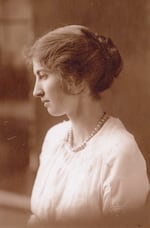
Grande Ronde Valley resident Grace Carter McKennon pictured circa 1918. The mother of three died suddenly after contracting scarlet fever in 1926.
Courtesy of the Reece Family Archive
“My mother was 8 and Jean became my mom’s surrogate mother,” she said.
Melissa and her sisters grew up calling Jean as “Grandmother.”
But Grace’s death was not the only tragedy for Jean in 1926; that same year, her 9-year-old son Gordon was killed in a horse accident.
“It must have been a very tough year for her, a very tough year,” Jessica said. “And I think that year must have been a turning point for her also because at that point, or very soon after that she began leading groups of women into the wilderness, and they would go alone without any men.”
The “Hen Party’' groups consisted of between six and 10 women, who would ride horseback into the Wallowas. Bringing in staples like flour, cradling eggs inside bags of horse feed and foraging for edible plants along the way, the women would stay in the mountains for up to two weeks.
“I think Jean wrapped herself in that memory, knowing comfort through being in nature and with her friends and animals,” Melissa said. “And I think she knew that other women would benefit from it as well.”
Jessica agreed.
“Sometimes, you just need to be with your own kind and kind of compare notes and strengthen each other, coming out and talking about these things that are hard to talk about like grief or how you feel about marriage, and I think it was very therapeutic for them,” she said.
The price of freedom
Today, it’s not unheard of for groups of women to navigate the Wallowas’ craggy granite landscape on horseback, to set up and take down camp each night, and wrangle horses on their own. But in the 1930s, this kind of freedom was a lot more work; there were no JetBoils for heating water instantly or Gore-tex for staying warm and dry. The Hen Party women didn’t even sleep in tents.

In this image provided by the Reece Family Archive, the "Hen Party" poses for a photo just before heading into the Wallowas Mountains. Jean Birnie, the group's leader, stands on the far right with a packhorse circa 1933.
Courtesy of the Reece Family Archive
“They slept on the ground. They put their bed rolls—you know, wool blankets—across the front part of their saddle, and they just slept on their horse blankets,” Melissa said. “I think for them—and for Jean especially—the idea was to get as close to the ground and as close to nature as possible.”
Along with being physically challenging, Hen Party trips cost money, and none of the participants was wealthy.
“They were just town women who could ride a horse, and they really couldn’t afford to take these trips. But they would figure out a way. They broke down the cost to like $6.50 apiece,” laughed Jessica, referring to a 1945 list of supplies and columns of tallied figures among Jean’s documents. But the costs were not just financial.
“It was a huge sacrifice for their families because they’d be gone for two weeks,” she said. “And these are the women that ran the household.”
Household management meant looking after children, caring for elders, preparing meals — often growing the food from which they were created — and doing all the household chores by hand. In rural Eastern Oregon, where modern conveniences were rare and families often raised farm animals, it was even more work.
Perhaps surprisingly, Jessica found no evidence that Hen Party husbands put up much resistance.
“Everybody seemed to be fine with it,” she said.
Despite the hardships and sacrifices, Hen Party women ventured into the mountains together for some 30 years, likely every summer until the mid-1950s. The freedom of being in the mountains on their own must have been worth every price it exacted.
“When you get into nature you sort of pare everything away and you find your fundamental self, and you’re sort of put to the test too. It’s usually kind of rough but you come out of it stronger,” Jessica said. “They would come out of it empowered.”

A view of alpine lakes and glacier-carved valleys as seen from the top of Eagle Cap in northeastern Oregon in August 2023. Hen Party women would revel in the epic glory of scenes like this.
Jule Gilfillan / OPB
A voice for conservation
Jean shared her love of nature with her friend U.S. Associate Supreme Court Justice William O. Douglas, who spent much of his time away from court in the Wallowas. Melissa thinks Douglas’ wife Mildred Riddle and her sister Katharine Snider were members of the Hen Party. Like Justice Douglas, Jean was a vocal advocate for wilderness conservation.
“Locally, she was pretty well known,” Jessica said. “During the 1970s, she fought hard for the ‘Save the Minam’ project.”
The “Save the Minam” campaign was a conservation movement chaired by Jean’s son-in-law Dan Reece. The group formed in opposition to a proposal to build roads into the unprotected Minam River drainage to harvest timber. For locals, the Minam is the gateway to the Wallowas.
After more than a decade of wrangling, Oregon Senator Mark Hatfield championed the cause in Congress and the campaign prevailed. In 1972, an additional 73,000 acres were added to the Eagle Cap Wilderness.

An article in the La Grande Observer newspaper published Aug. 1, 1951 includes an example of how newspapers would post articles noting annual Hen Party trips. As was typical of the time, the women involved were not called by their own names, but by "Mrs." followed by their husbands' names.
La Grande Observer
As influential as Jean Birnie was, when the Hen Party women would make their annual trips into the mountains, the local newspaper would identify the participants not by name, but by printing “Mrs.” alongside their husbands’ names.
“Which is very ironic because they were actually doing something without their husbands,” Jessica chuckled.
Melissa and her daughters Leah Over and Casey Jane Reece-Kaigler were among the group of seven women who returned to the Eagle Cap on horseback last summer. Together, they visited many of the Hen Party’s favorite spots, cooked Hen Party dishes over open fires and revelled in the glory of the Wallowas.
“There’s so many women now who are taking their pack trips in. They know the importance of being in nature and what you can gain from that,” Melissa said. “When I think of the Hen Party and Jean, I would think that she knows that it’s living—that the legacy lives on.”

The modern-day horsewomen descended from the "Hen Party" in an East Lostine River meadow in Oregon’s Eagle Cap Wilderness, on August 11, 2023. (Left to right) Jeanie Mascia, McKenzie Funk, Leah Over, Casey Jane Reece-Kaigler, Melissa Over, Sharon Masica and Sally Deitchler.
Brandon Swanson, Brandon Swanson / OPB

